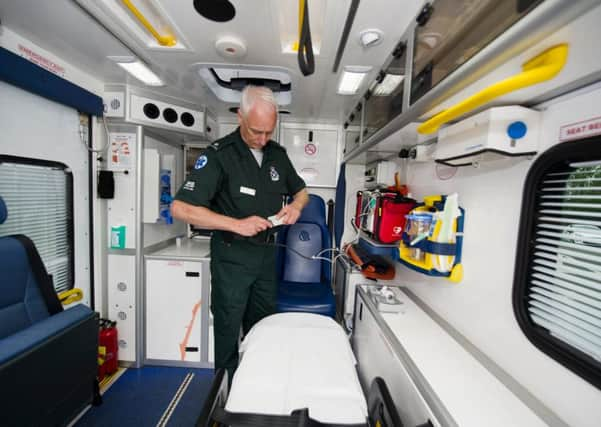Paramedics to make house calls to ease load on Capital's GPs


The emergency responders are set to start a full trial of the service next month following an initial pilot and could cover all appropriate afternoon unscheduled house calls in the Capital by April next year.
Deploying paramedics to carry out house calls is one of a dozen different proposals of the Edinburgh Health and Social Care Partnership’s Primary Care Improvement Plan, which has been handed over to the Scottish Government for approval.
Advertisement
Hide AdAdvertisement
Hide AdThe policy has been piloted in Scotland and at least two GP practices in Edinburgh are already using paramedics for some house calls. The partnership believes it is important the work continues with careful consideration of patient safety.
House calls are not routinely counted or reported by health officials and can vary enormously per practice.
It is estimated that approximately 500 house calls are made each weekday across Edinburgh.
The new Scotland GP contract, which came into force in April, included reducing GP workload through the expansion of the “primary care multidisciplinary team”. Judith Proctor, chief officer of Edinburgh Health and Social Care Partnership, said: “The partnership’s Primary Care Improvement Plan, which has now been submitted to the Scottish Government, outlines our plans to implement our response to the new GP contract introduced back in April.
Advertisement
Hide AdAdvertisement
Hide Ad“It is an ambitious redesign of primary care services developed by the Edinburgh Health and Social Care Partnership and GPs and is in essence a change in how services will be delivered.”
She added: “We see this as the next stage in improving primary care for everyone.
“The plan is wide ranging and one of several key strands of transformation work the partnership is developing and it is our intention to explore all options for supporting access to safe and effective services and identify where the greatest impact will be.
“New models of home visiting for those people unable to get to a primary care centre include appropriately trained and supported paramedics undertaking initial triage in a model fully supported by doctors based back at the practice.
Advertisement
Hide AdAdvertisement
Hide Ad“This enables us to visit people at home, as well as supports GPs seeing patients in the practice.”
GP practices in Edinburgh have been under increased pressure since 2014.
Around 20 of the Capital’s 72 GP practices have needed “additional support and attention” in order to provide services to registered patients. More than 40 practices in Edinburgh have restrictions on their patient lists.
The primary care plan claims “a series of once-stable independent GP practices are no longer able to function without additional support”.
Advertisement
Hide AdAdvertisement
Hide AdIt added: “General practice in Scotland has been under increasing pressure over the last ten years due to a combination of changes in demography, technology and treatment regimens, and workforce availability.”
In order to carry out house calls, around 15 paramedics in Edinburgh have undertaken “additional specialist training”. Another 15 will undergo the skills programme by the end of this year.
Some paramedics have been able to prescribe medicine since April.
In the pilot scheme, paramedics worked across more than one practice and also undertook non-house call duties, including face-to-face consultations.
Advertisement
Hide AdAdvertisement
Hide AdThe action plan says: “There is a requirement to maximise the effectiveness of this resource in terms of benefit to GPs, who are the only others able to do this work and who often ‘fit in’ unscheduled house calls round scheduled care.
“Some house calls relate to lack of transport. Providing that would also maximise cost-effectiveness.”
The Scottish Ambulance Service welcomed the move, following the successful pilot scheme. Dr Jim Ward, medical director of the Scottish Ambulance Service, said: “GP practices across the whole of Scotland are facing huge pressures. One of these is responding to patients who become unexpectedly unwell and who need to be assessed in addition to all the patients who already have appointments.
“Paramedics are specialised in assessing all types of emergency and urgent presentations and transferring this skillset into primary care has seen a real benefit in supporting GPs and others in the primary healthcare team.
Advertisement
Hide AdAdvertisement
Hide Ad“This project helps patients to access the help they need sooner and often in the familiar setting of their own homes.”
He added: “Our paramedics are highly skilled and this initiative enables the wider health and care system to utilise their knowledge and experience to better benefit the communities they serve. Importantly it frees up a lot of time for GPs, meaning they can direct their focus where it’s most needed – on more complex cases.
“In addition, enhancing paramedics’ skills will enable them to work more autonomously and offer a wider range of treatments.
“Not only will this improve the care patients receive, but it will potentially reduce the number of avoidable attendances at hospital emergency departments.”
Advertisement
Hide AdAdvertisement
Hide AdThe proposals have been welcomed by GP leaders, who believe the idea could help ease doctors’ workload.
Dr Andrew Buist, deputy chairman of the BMA’s Scottish GP committee, said: “The new GP contract in Scotland aims to reduce workload pressures and re-establish general practice as an attractive career choice.
“It provides for an expanded multi-disciplinary team to work with GP practices to provide direct access to services for patients, allowing GPs to concentrate on being expert medical generalists.”
